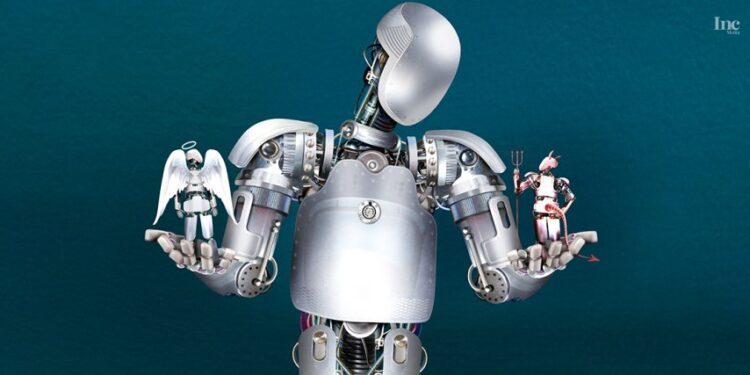AI is a pioneering name in the world of technology, and it is rapidly expanding everywhere. The progression of Artificial Intelligence and Machine learning has led to its practical implementation in various sectors and areas. However, the question here is whether machines can be completely accurate or if they can also go wrong. And who’s responsible if that happens?
Ethical AI is still in a questionable zone as there are several related issues, such as data privacy, security, understanding of requirements, and overall performance. The handling of technology in a responsible way could result in fostering progress and growth in society. It is important to chalk out the right balance before relying on them to make important decisions. Let’s dive into its further complexities and details!
Role of AI- How is it Making the Difference?
AI or artificial intelligence is a well-carved computer science that has reliability on computers for finding a solution to issues by processing the available information on it. AI is enabling the creation of constant change with the intervention of technology in every aspect of life. We must admit that creating an ethically sound AI ecosystem is important to streamline the processes correctly.
AI behavior is subject to unique algorithms that drive the program to run data and encounter problems. This technology is bound to grow exponentially in the coming times as its more precise, cost-effective, and can replace human resources. But what about the outcomes and consequences of AI?
Privacy Concerns with AI
Data privacy is always at stake when an artificial program evaluates the data or information. The overall sum of personal data gathered by companies globally has always been a debatable issue as people are pondering ways to manage their own data.
Another fear is the unregulated AU that can be tempered for other purposes, such as tracking someone without consent or surveillance purposes. These algorithms can efficiently reproduce a wide range of fair outcomes that might negatively impact society in different ways and manners.
It is mandatory to create boundaries for handling AI effectively to cope with all types of applications and even manage the associated risks.
What are the Potential Benefits of AI?
• Artificial Intelligence can skillfully handle complicated and time-consuming tasks that humans find tricky.
• It minimizes the use of manual labor and increases efficiency levels.
• AI can prove helpful in the analysis of customer behavior by tracking the purchase history, data points, and browsing patterns of the users.
• Data generated can prove beneficial in making decisions and strategies relevant to product development.
Other AI benefits include generating predictions about the input data by analysis of past trends and making decisions accordingly. Ethical AI can result in a wide range of benefits to society on the whole.
Ethical Concerns on AI
AI is progressing rapidly, but there are also certain ethical concerns related to them. However, the implementation of integrating this technology ethically always emerges as the biggest concern. Companies can capture a wide chunk of personal data at threat of exploitation without the user’s knowledge or consent.
The next issue lies in the AI development process itself. Leaving it unchecked might result in making wrong decisions about machines instead of applying logic to them. It might get biased due to errors in human coding at the training stage. To mitigate such concerns, developers must undergo in-depth product testing that involves the usage of AI technology.
Employment Implication of AI
Artificial Intelligence has complex employment implications, and it optimizes the cutting-edge technologies that are important for responsible deployment. Many tech giants, such as Google, are integrating technological progress with the responsibility to keep it under the moral compass efficiently. If done responsibly and with the right balance, automation can pave a brighter path for the coming generations.
Regulatory compliance
The ethical configuration of AI is also subject to regulatory compliance as it adheres to crucial compliances set by the government organization. Not following them might result in consequences such as criminal charges or penalties.
Final Thoughts
Ethical AI can share the future of society in a better manner, provided we learn to integrate it responsibly across various funnels. A prioritized approach to using AI in the right manner can help users to refrain from the potential risks associated with it.
This technology can serve as a pool of enticing opportunities when handled with regulatory compliance and responsibly. It is possible to create a bright future by assimilating AI and ethics on the grounds of trust and credibility towards the technology!















 The Inc Media is one of the most renowned global Online Business Magazines, that carries news stories about entrepreneurship, small business management, and business. Being a global business magazine, we carve for influential stories and try to take them globally to uplift the business standards and educate the people about new innovations in the business world...
The Inc Media is one of the most renowned global Online Business Magazines, that carries news stories about entrepreneurship, small business management, and business. Being a global business magazine, we carve for influential stories and try to take them globally to uplift the business standards and educate the people about new innovations in the business world...